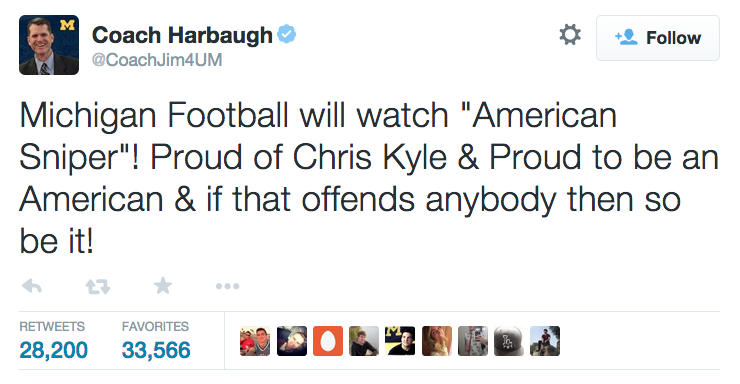The University of Michigan recently announced it would cancel a screening of American Sniper, the acclaimed story of Navy SEAL Chris Kyle, in response to a petition filed by nearly 300 students, mainly members of the Muslim Students’ Association and Palestinian solidarity group Students Allied for Freedom and Equality (SAFE), who claimed the film was “dangerous anti-Muslim propaganda” and whose protagonist was a “racist” and “mass killer”. Immediately, the University apologized for “causing harm” to members of its community and announced it would instead show the movie ‘Paddington’, a story of a lost teddy bear.
Later that night, Editor-in-Chief Derek Draplin leaked the University’s correspondences in The College Fix. Within hours, major news networks rushed to cover the story, triggering waves of outrage throughout the country. The story even drew the ire of Michigan’s Football Coach Jim Harbaugh, who tweeted:
A petition urging a reversal of the University’s decision was filed by Michigan Law student Rachel Jankowski, who quickly garnered the support of almost 600 students and alumni.
Facing backlash, the University’s Vice President for Student Life E. Royster Harper publicly apologized for canceling the movie and announced that the screening of American Sniper would proceed as originally planned. “The initial decision to cancel the movie,” Harper admitted, “was not consistent with the high value the University of Michigan places on freedom of expression and our respect for the right of students to make their own choices in such matters.” But the story doesn’t end there.
Controversial statements by the original petitioners have recently surfaced, prompting many to question whether the movement to cancel the film was truly motivated by ‘compassion and respect towards others’ as members of SAFE and the MSA claimed, or whether these students sought to advance a different agenda.
Zeinab Khalil, a Michigan alumnus who championed the alleged effort of the petition to “offer compassion and respect towards everyone,” was the subject of an investigation last year by the Dean of Students after she took part in vandalizing the apartment of Review columnist Omar Mahmood after she disagreed with one of his articles. Her partner in crime, Zainab Masood, also signed the MSA’s petition.
The original language of the petition that advocated compassion and respect is collapsing under the powerful scrutiny of students and journalists who, regardless of political affiliation, are not receptive to deceit. The behavior of SAFE and the MSA targeting people who have different points of view should be repugnant to all Americans regardless of their particular political views or philosophies. Yet the ongoing use of dishonesty to advance political agendas can only be viewed as behavior nothing less than outrageous.

